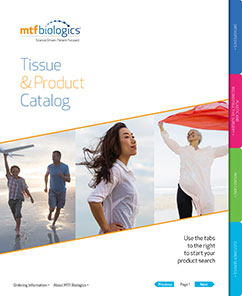MTF forms new wound care division to meet growing medical need
December 22, 2014 — The Musculoskeletal Transplant Foundation (MTF) announced today the launch of MTF Wound Care—a new MTF division dedicated to researching, developing and providing allograft-based, biologic solutions to treat acute and chronic wounds.
MTF Wound care is a natural extension of MTF—the non-profit is the nation’s leading tissue bank supplying specialty donated human tissue for orthopedics, spine, plastic surgery, general surgery, sports medicine, and beyond. Founded and run by physicians, MTF maintains strict standards for donor recovery criteria and tissue processing. With over 100,000 donors recovered and over six million grafts distributed since its founding, MTF has maintained an exemplary reputation for safety and quality.
According to Kim Rounds, Vice President of MTF Wound Care, the organization will initially offer two tissue forms: AmnioBandTM Membrane, a human derived allograft placental matrix; and AlloPatchTM Pliable, a human derived allograft dermal matrix. Both will be available in January 2015.
“These two innovative tissue forms are excellent examples of what we can bring to wound care professionals and their patients,” said Ms. Rounds. “Both AmnioBand and AlloPatch work in concert with the body’s natural healing process. They are the first of what we plan to be a broad and differentiated portfolio of offerings for wound care. Our focus, as always, is to develop solutions that are highly advanced, safe, clinically based and cost effective.”
According to the National Institute of Health (NIH), treating chronic wounds is a growing concern, fueled by increasing costs, an aging population and a sharp rise in such conditions as obesity and diabetes. NIH reports that in the United States alone, more than $25 billion is spent annually to treat chronic wounds.
Diabetes is a particular concern among wound care professionals, because the condition contributes directly and most heavily to the growing wound care problem:
• The World Health Organization (WHO) estimates that there are about 347 million people with
diabetes worldwide, and that number is expected to rise considerably by 2030.
• About 25% of people with diabetes will suffer a lower extremity ulcer over their lifetime. Since healing
is typically slow in diabetics, there’s an increased risk of infection and a higher risk for amputation.
In fact, diabetic ulcers precede 85% of lower extremity amputations.
“The statistics are sobering,” said MTF President and CEO Bruce Stroever. “It is at the core of MTF’s mission to do all we can to help patients in need. Through the generous gift of tissue donation, MTF can develop advanced, biologic tissue forms designed to optimally support the wound-healing process. We can make treating wounds better and more effective for everyone: patient and practitioner alike.”
To learn more about MTF Wound Care, contact Kim Rounds, Vice President, MTF Wound Care at kim_rounds@mtf.org.
